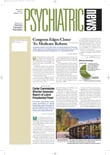To address the career development needs of residents and early career psychiatrists (ECPs), APA is sponsoring special leadership sessions at its Institute on Psychiatric Services in Boston next month. Topics for these sessions include media training, advocacy training, cultural-competency training, and transitioning from psychiatry resident to ECP.
The first session, “Making the Media Work for You,” will be led by Nada Stotland, M.D., APA secretary and former chair of APA’s Joint Commission on Public Affairs. Participants will learn how to conduct a successful interview, from handling stress to positioning in front of a camera or interviewer. The session, which includes several case scenarios, will be held Thursday, October 30, from 10 a.m. to 11:30 a.m.
Stotland noted that the goal of this interactive workshop is to alleviate the stress of television interviews by teaching basic media skills. Participants will come away with the skills needed to teach the public about psychiatry; show the public that psychiatrists are accessible, caring, and knowledgeable professionals; and how to have a good time while doing this work.
Knowledge about legislation affecting the practice of psychiatry and patients with mental illness is important, but psychiatrists who communicate with elected officials are the ones who really make an impact. APA’s Council on Advocacy and Public Policy has initiated a renewed outreach to psychiatric residents on legislative advocacy. There are many resources available to inform psychiatrists about legislative issues such as insurance parity for the treatment of mental illness, medical-record confidentiality, access to psychiatric care, and psychotropic medications.
The session “Advocate to Rejuvenate—A Prescription for Legislative Success” will prepare psychiatrists to advocate for critical legislation. It will be held on Thursday, October 30, from 1:30 p.m. to 3 p.m. The chair is David Pollack, M.D., with participants Kamlyn Haynes, M.D., and Ericka Goodwin, M.D.
Cultural competency is another crucial skill for residents and ECPs. Led by Carl Bell, M.D., the session titled “When the Patient Is Different From You” will educate participants on the concept of ethnocentric monoculturalism and enable them to list two major mental health factors for each nonwhite racial group within the United States. The cultural-competency session is scheduled for Saturday, November 1, from 1:30 p.m. to 3 p.m.
“The Other Side of the Mountain: From Residency to Reality,” led by Stephen Goldfinger, M.D., Stuart Anfang, M.D., Sandra DeJong, M.D., and Cynthia Tellingator, M.D., is one of the most popular sessions for residents and ECPs.
The transition from resident to ECP is a challenge all psychiatrists face. Trainees in every program learn the basics of clinical psychiatry; however, many programs address only peripherally, or not at all, how to translate this training into practice.
This discussion between ECPs and senior professionals—to be held on Saturday, November 1, from 3:30 p.m. to 5 p.m—will explore how training programs have and have not met young professionals’ needs, and how young doctors can acquire the skills to prepare them for the challenges in their first few postresidency years.
“I encourage you to attend these career development sessions,” said Deborah Hales, M.D., director of the APA Division of Education, Minority, and National Programs. “There is always a lively dialogue between the audience and panelists and among the panelists themselves. It is a wonderful opportunity to share personal experiences and get answers to questions about finishing training. We hope residents and ECPs take full advantage of all these sessions.” ▪
